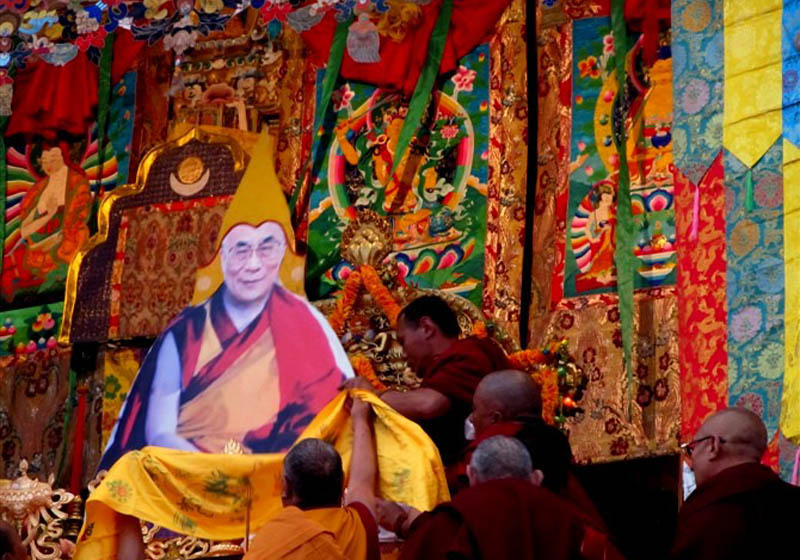Dharamshala: - The Chinese government has strongly denied recent reports that it is moving toward easing the decades long hard-line policy of banning portraits of His Holiness the Dalai Lama at some areas in Tibet.
 Dharamshala: - The Chinese government has strongly denied recent reports that it is moving toward easing the decades long hard-line policy of banning portraits of His Holiness the Dalai Lama at some areas in Tibet.
Dharamshala: - The Chinese government has strongly denied recent reports that it is moving toward easing the decades long hard-line policy of banning portraits of His Holiness the Dalai Lama at some areas in Tibet.
In an official statement, the state bureau for religious affairs told the BBC there had been no policy change, while responding to recent reports claiming Tibet may lift 17-year ban on portraits of His Holiness the Dalai Lama.
The official statement comes after local reports claimed that restrictions on displaying portraits of His Holiness the Dalai Lama had been eased in some areas of eastern Tibet, including Lhasa, the capital of Tibet.
A proposal to display portraits of His Holiness the Dalai Lama, end denunciation of the Tibetan leader, and lessen police presence in monasteries and nunneries have been discussed at a series of meetings in Tsolho (Chinese: Hainan, Qinghai) and Kham Karze (Ganzi, Sichuan), eastern Tibet, according to several unconfirmed sources in past few days.
It has been widely covered after circulating on various social media that monks in Gaden Monastery in Tibetan capital Lhasa, and in some areas of eastern Tibet, may have been told that they are allowed to display portraits of His Holiness the Dalai Lama.
But monasteries contacted by the BBC said they were unaware of any change in policy and, in a faxed statement to the BBC on Friday, [June 28, 2013] the government said that China's policy towards the Dalai Lama was "consistent and clear".
"If the Dalai Lama wants to improve his relationship with the Central Government, he must really give up his stance in favour of 'Tibetan Independence' or independence in any disguised forms," said the government statement to BBC.
His Holiness the Dalai Lama has repeatedly and consistently stated that he is not seeking separation or independence. His Holiness says Tibetan side only seeks a 'genuine autonomy for the Tibetan people' that would ensure the long-term survival of Tibetan Buddhist culture, Tibetan language and Tibetan distinct identity as a people.
The BBC said it "was unable to confirm this news, despite repeated phone calls to monasteries in Lhasa, the capital of the Tibetan Autonomous Region, and Tibetan areas in the provinces of Qinghai and Sichuan."
"Several monks admitted they had heard of possible changes to the government's long-standing policy, but said they had not witnessed any relaxation in policy themselves," Celia Hatton BBC Beijing correspondent reported.
"Portraits of the Tibetan spiritual leader are still banned, the monks explained. Only officially sanctioned images of the Buddha are permitted to be displayed," one monk in Lhasa has confirmed BBC on Friday.
Some sources said that local Chinese official are playing tricks with the local Tibetans in recent days, in a bid to prevent further protest against China's repressive policies on Tibetans, as Beijing officials may allow some foreign tourist and journalist groups to enter Tibet near future.
The US based Human Rights Watch, however says 'Beijing has sealed off large areas of the Tibet plateau to outsiders, barring foreign journalists and limiting access by diplomats, Western tourists and non-Chinese researchers.'


![Tibet has a rich history as a sovereign nation until the 1950s when it was invaded by China. [Photo: File]](/images/stories/Pics-2024/March/Tibet-Nation-1940s.jpg#joomlaImage://local-images/stories/Pics-2024/March/Tibet-Nation-1940s.jpg?width=1489&height=878)















